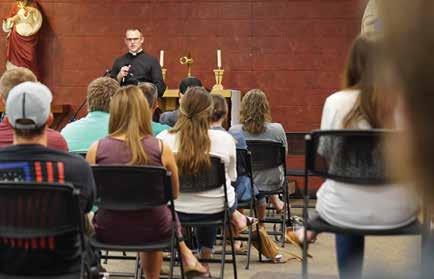
6 minute read
THE ART OF NURSING
Catholic Nurses Create Network of Support
BY SUSIE BERGMAN
Advertisement
Nursing is not only a complicated science, it is a magnificent art. In addition to employing years of scientific training and study, frontline healthcare professionals must also become masters of emotional intelligence. There’s a subtle, yet indistinguishable beauty that emerges when the practice of human empathy, compassion and science combine.
The role of a Catholic nurse is even more crucial. We live in an age where the sanctity of human life is on a steady decline. Nurses often find themselves in situations where their moral beliefs are challenged. Abortion, euthanasia and the dilution of prayer can leave many healthcare professionals feeling alone against a mountain of unethical opposition.
Janet Munday knows that feeling well. “When I joined the National Catholic Nurses Association (NCNA) in 2014, I was working as an operating room nurse. I had a difficult time finding a supportive, professional group that aligned with my pro-life stance.” She is also employed by Wapakoneta schools as a substitute nurse. Since joining NCNA, she has been exposed to people who have strengthened her faith. “Christ has become very tangible for me in the children and staff I care for as a school nurse. I believe that growing deeper in my Catholic faith will not only make me a better disciple, but also a better nurse so as to see Christ in each person I meet.”
The history of NCNA dates back to 1909, when the Guild of St. Radegone for Nurses was formed in Boston. Today there are councils in 10 states, including Ohio. Although the archbishop granted permission to create a council within the Archdiocese of Cincinnati, it has not yet been properly formed. Munday hopes her testimony can encourage other nurses to consider joining.
“I’ve met a tremendous cadre of Catholic nurses throughout the U.S. My favorite way to meet nurses is at local council meetings. I’ve recently attended Mass and meetings in Columbus, Cleveland, Kalamazoo and Lansing. These local councils are made up of superstar nurses who are on fire for their faith because of their love and devotion to our Lord,” she said.
Aside from meetings, there are also opportunities for Catholic nurses to call, text and email other members for support, inspiration and to form bonds with nurses throughout the diocese, nation and world. Additionally, the NCNA keeps members informed.
“I’ve grown in understanding of Christ’s love for me through interactions with members,” said Munday, “As the communications chair, I sort through emails that come to the organization from nurses. Many are struggling, hopeless and even want to leave the profession. That’s when the passion within me is ignited and I use Catholic teaching to support and encourage them to stay focused on their calling.”
Munday also said since joining the organization she has developed a more dedicated prayer life. She credits starting each day with a morning offering and prayer to St. Michael to calming the constant chaos that can overwhelm even the most experienced nurse.
“I’m in awe of Catholic nurses who have experienced the presence of saints in the chaos of the emergency room or oncology unit; anywhere patients and families are in desperate need of spiritual care. If we support strong Catholic nurses in our communities, we cultivate a strong Christian structure that rises above the chaos and evangelizes the sacred beauty of life,” she said.
THE BEAUTY OF SPOUSAL LOVE
As the great poet Huey Lewis said, “The power of love is a curious thing. It makes one man weep, another man sing; changes a hawk to a little white dove. More than a feeling, it’s the power of love!” Indeed, Huey, love is a powerful thing. Not only can it cause one to weep in anguish and another to sing for joy, but it can stir both reactions in the same person.
Why does love have such power over us? Why does it move us to such extremes? The answer lies in the fact that the things that are most important to us elicit the strongest emotional reactions. Love stirs such ecstatic joy and earthshaking anguish because it is what we are made for. To paraphrase Pope St. John Paul II, we are made out of love for love; love is the innate vocation of every human being. It is our origin and end since we are made in the image of God who is love, a Communion of Persons. There is nothing more important, more vital, more necessary to human life than love.
Love, however, comes in many forms. There is the tender love between a parent and child, the affection and loyalty of friends, the passion between young romantics and the self-sacrificing love of the saint. Spousal love is perhaps the the most vexing form of love because it incorporates all of these. That’s what also makes it so beautiful and so mysterious. Spousal love is the total gift of self of one person to another for the whole of one’s life. It is a free, exclusive, permanent, total and fruitful gift.
When a baptized man and woman make this total gift of self through marriage vows and physical union, an indissoluble, sacramental bond is formed. Living this out is the challenge! To do so successfully, the sacramental bond must be complimented by a vital, emotional bond. While the former is solid and unchanging, the latter bond requires continual nurturing and repair. This tending of the emotional bond is a central task in the vocation of marriage. It is a big part of how marriage challenges us to grow as men and women and as followers of Christ.
In tending their bond, Christian spouses are called to learn to be there for each other, sacrificing for one another and caring for one another after the model of Christ. However, we also have to learn to be vulnerable with one another. After all there can be no giving of love without a recipient. When we take this receptive stance by opening our hurts, fears and longings to our spouse, we are giving him or her a chance to be Christ for us. In a sacramental relationship, this also means that we are opening our vulnerabilities to the grace of Christ coming to us through our spouse. Through these encounters, we strengthen our bond and grow more secure with each other. In this way, the growth of the marriage is inseparable from our growth in holiness.
As spouses learn to give and receive love, allowing the love of Christ to work in them and through them, they and their children, who are the fruit and personification of their love, form a communion of persons. Marriage then becomes an exquisite sign, a beautiful, living icon of the Most Holy Trinity. Seen in this heavenly light, it is no wonder spousal love causes us to alternately weep and sing for joy. It stirs up in our hearts the desire for our true home, the eternal exchange of love that is Father, Son and Holy Spirit. Indeed, that’s the power of love!
DR. ANDREW SODERGREN
is a Catholic psychologist and director of psychological services for Ruah Woods. He speaks on topics related to the integration of psychology and the Catholic faith. He and his wife, Ellie, have been married 21 years and have five children.






